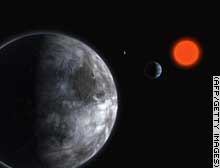Is political conflict bred in the bone (or, put less charitably, do some among us just have an easier time with higher-order thinking)? A new joint NYU-UCLA neurobiological study finds once again that left- and right-leaning brains function differently, with liberal minds more receptive to change than their conservative counterparts. “Dozens of previous studies have established a strong link between political persuasion and certain personality traits. Conservatives tend to crave order and structure in their lives, and are more consistent in the way they make decisions. Liberals, by contrast, show a higher tolerance for ambiguity and complexity, and adapt more easily to unexpected circumstances…[In this case] respondents who had described themselves as liberals showed ‘significantly greater conflict-related neural activity’ when the hypothetical situation called for an unscheduled break in routine. Conservatives, however, were less flexible, refusing to deviate from old habits ‘despite signals that this…should be changed.’”
Category: Science
“This is our flight.”
“For Barbara Morgan and her crewmates, class is in session.” Congrats to schoolteacher Barbara Morgan, who rocketed off into space today aboard the Endeavor, fulfilling both a lifelong dream and the mission originally set for Christa McAullife and the Challenger crew 21 years ago. Godspeed.
TheLeft.com
“What was once seen as a liability for Democrats and progressives in the past — they couldn’t get 20 people to agree to the same thing, they could never finish anything, they couldn’t stay on message — is now an asset,’ Leyden said. ‘All this talking and discussing and fighting energizes everyone, involves everyone, and gets people totally into it.‘” The WP’s Jose Antonio Vargas examines why the Dems are winning the Web War. “‘For Republicans, the Internet is where bad things happen. Take [former U.S. senator] George Allen and his ‘macaca’ moment…You can kind of understand why Republicans have this almost instinctive fear of the Internet, where the mob rules.”
Phoenix Rising.
NASA prepares a probe, named Phoenix, to dig for water on Mars. “Upon reaching Mars in May 2008, the spacecraft is to land just as the winter ice begins to recede around the polar cap.”
Hawking Swoops and Soars.
“I have long wanted to go into space, and the zero-gravity flight is the first step toward space travel.” Physicist Stephen Hawking experiences zero gravity aboard the Vomit Comet. “Hawking said he hoped his flight would provide a boost for commercial spaceflight, in line with his oft-expressed belief that humanity’s future depended on moving beyond Earth…’I think that getting a portion of the human race permanently off the planet is imperative for our future as a species. It will be difficult to do this with the slow, expensive and risk-averse nature of government space programs,’ Hawking said, working in a veiled reference to NASA. ‘We need to engage the entrepreneurial engine that has reduced the cost of everything from airline tickets to personal computers.‘” I’m in full agreement…far be it from me to differ with a man as intelligent, knowledgeable, and solid on the mic as Mr. Hawking.
Sol to Gliese, over?
“Because of its temperature and relative proximity, this planet will most probably be a very important target of the future space missions dedicated to the search for extraterrestrial life. On the treasure map of the Universe, one would be tempted to mark this planet with an X.” The big news today, of course: Astronomers announce the discovery of an earth-like planet, Gliese 581c, at the galactically tiny distance of 120 trillion miles (20.5 light years) away. (For the stargazers, Gliese 581 is a red dwarf “located in the northeastern part of constellation Libra.”) Of course, we still don’t know if we even have to go that far to find extraterrestrial life — Europa, Mars, Ganymede, and Callisto all still pose unresolved questions. Nevertheless, it’s an exciting moment in our history to discover the first planet far afield that might possibly be inhabited (and inhabitable)…and even more exciting to know that there’ll assuredly be many more to come. The stars, our destination!
Water, Water Everywhere?
A faraway Jupiter-like gas planet, HD 209458b, is found (by some) to have water in its atmosphere. I saw this on Blivet on Friday and spent the weekend dreaming about it: If my sleeping brain can be trusted, HD 209458b has winged, eel-like space reptiles cavorting amidst the gaseous clouds there. Alas, my subconscious makes for a lousy exobiologist: “[A] Jupiter-like gaseous planet such as this one, as opposed to a rocky one like Earth, is highly unlikely to harbour any kind of life.” Well, damn.
The World Forgetting, by the World Forgot.
Eternal sunshine of the spotless mind! Each pray’r accepted, and each wish resign’d. Life imitates art as researchers hone in on drugs that will potentially erase traumatic memories. “‘This is all very preliminary,’ said Dr. Roger Pitman, a Harvard Medical School psychiatrist. ‘We’re just getting started. There is some promising preliminary data but no conclusions.‘”
Wikijected.
“If you’ve never been listed in Wikipedia, you can always argue that your omission is an oversight. Not me. I’ve been placed under a microscope and, on the basis of careful and dispassionate analysis, excluded from the most comprehensive encyclopedia ever devised. Ouch!” Slate‘s Tim Noah discovers he’s not famous enough for Wikipedia (at first.)
Godspeed, ISS.
“To not utilize that station the way I think it ought to be utilized is just wrong.” Forty-five years to the day after his historic orbit, space pioneer and former US Senator John Glenn makes a case for the International Space Station.

